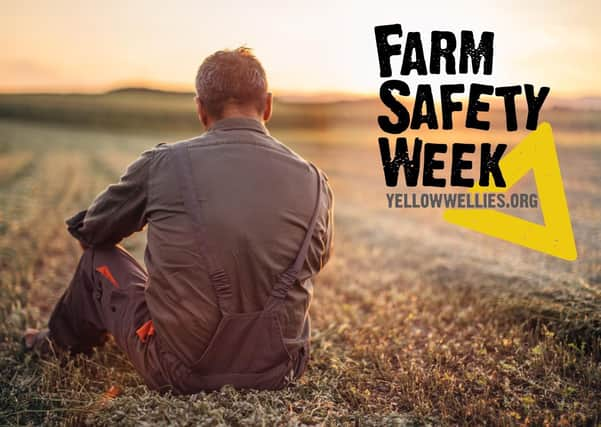Latest figures show no let up in accident rates


The industry accounted for five of the 13 workplace fatalities (38%) recorded in 2020/2021 in Northern Ireland Meanwhile, in the Republic of Ireland, farming accounts for 5% of the workforce but an alarming 40% of all workplace fatal incidents.
Now in its ninth year, Farm Safety Week brings together five countries – England, Wales, Scotland, Northern Ireland and the Republic of Ireland - over five days with one clear goal: to speak up for safety and encourage farmers to rethink risk so that the number of life-changing and life-ending incidents happening on our farms can be reduced.
Advertisement
Advertisement
“Agriculture is a vital part of our economy and everyone involved is rightly proud of the quality and standard of the food produced,” explained Adrian Hodkinson, Acting Head of Agriculture, Health & Safety Executive.
“However, this appears to come at a significant cost to many farmers and workers in terms of serious injury, lifelong ill health and in some cases death.”
He added: “The causes of farm incidents are well known and the things to stop them are usually straightforward: putting on handbrakes; fastening lap belts in cabs; getting ATV training and helmets; putting cows and calves in fields without footpaths; stopping things before trying to fix or unblock them and so on.
“When we investigate life-changing farm workplace incidents we find, time and time again, that risks are not being removed or managed. It is far too common for people to accept risk is an inevitable part of the job – this isn’t the case, the guidance is easily available to manage the risks and prevent injury.”
Advertisement
Advertisement
Ulster Farmers’ Union (UFU) president Victor Chestnutt said: “Farm Safety Week is a very important period in the calendar as it generates extra publicity, helping to raise awareness about staying safe on the farm all year round. “We work continuously to encourage farmers to take a moment to stop and think before they carry out work on the farm to ensure they are doing it in the safest way possible. Farmers have such a lengthy to-do list to get through each day and they often put their own safety at risk to get the job done as quickly as possible especially when the weather is on side. “Farmers work with unpredictable livestock and high-powered technology daily and it only takes a spilt second for a life changing injury or fatality to happen. Too many of our members across Northern Ireland have had near misses and it’s terrifying to think how different the outcome could have been. “In recent times there has been several accidents involving quads and it’s vital that when riding a quad, whether that be on the home farm or on public roads, please make sure you are wearing a helmet. Should an accident occur, a helmet could be the difference between losing a life and saving one. “We can never be careful enough when carrying out farm work and the vital message of farm safety needs to be constantly repeated so that it remains at the top of the agenda for farmers and their families.” Continued effort is needed to ensure a long term and sustainable reduction in farm accidents, and keeping children safe on farms is another huge concern. “With the summer holidays upon us, children will be present on the home farm much more than during any other time of the year and I urge parents and guardians to be extra vigilant.
The Union president concluded: “Children love to get out on the farm to meet the livestock and see the machinery and with their playful spirits, farms can seem like a great place to play. However, farms, and in particular working farms, are one of the most dangerous working environments and it can be very difficult to supervise children and work on the farm at the same time. “To protect children from on-farm dangers, I urge our members to put preventative measures in place. This includes providing children with a securely fenced off play area, ensuring unattended vehicles are kept locked, and discouraging children from using bales of any description for playing. “Parents and guardians need to set a good example for their children when it comes to farm safety as they are extremely observant and learn from us. Therefore, it’s vital that every farmer and farming family take the necessary steps to protect themselves.”
During Farm Safety Week (19-23 July) the Health and Safety Executive for Northern Ireland (HSENI) is encouraging the farming community to ‘wake up’ to the issue of tiredness during their daily routines.
Tiredness is a normal part of everyday life. It is particularly relevant to farming life in Northern Ireland in the summer period and during the silage season with farmers often working long into the evening to complete tasks.
Advertisement
Advertisement
HSENI Chief Executive Robert Kidd, said: “Tiredness and fatigue can have serious consequences within the farming community, and can lead to minor and major injuries and even fatality. HSENI is encouraging farmers and contractors to consider their working patterns and ensure that sufficient breaks are taken to combat the issue of tiredness.
“Over working can lead to conditions such as musculoskeletal disorders, work-related stress and decreased awareness which in turn can lead to incidents, so it is important not to underestimate the risks of tiredness.”
Advice on workplace occupational health issues can be found on the HSENI at https://www.hseni.gov.uk/topic/workplace-health